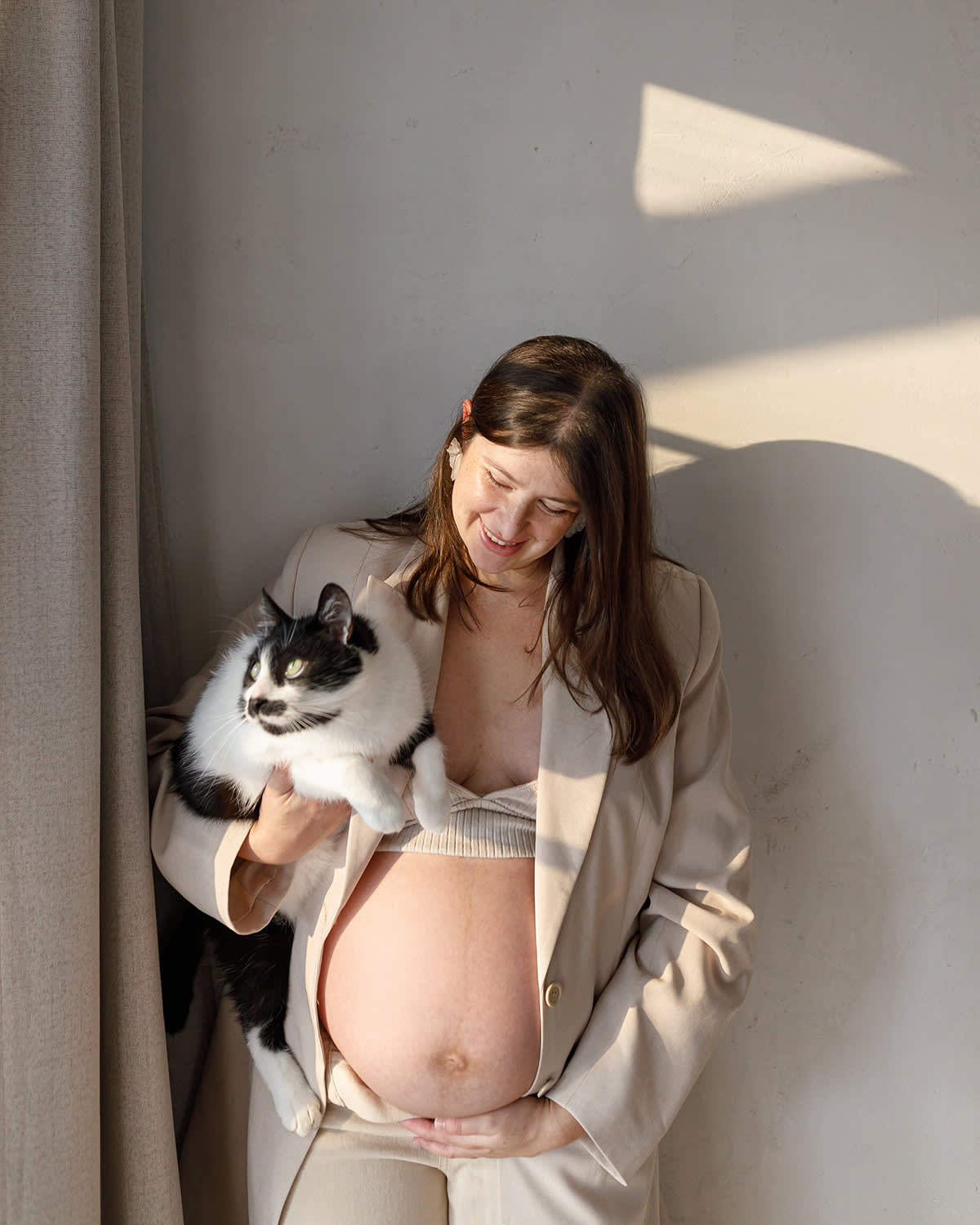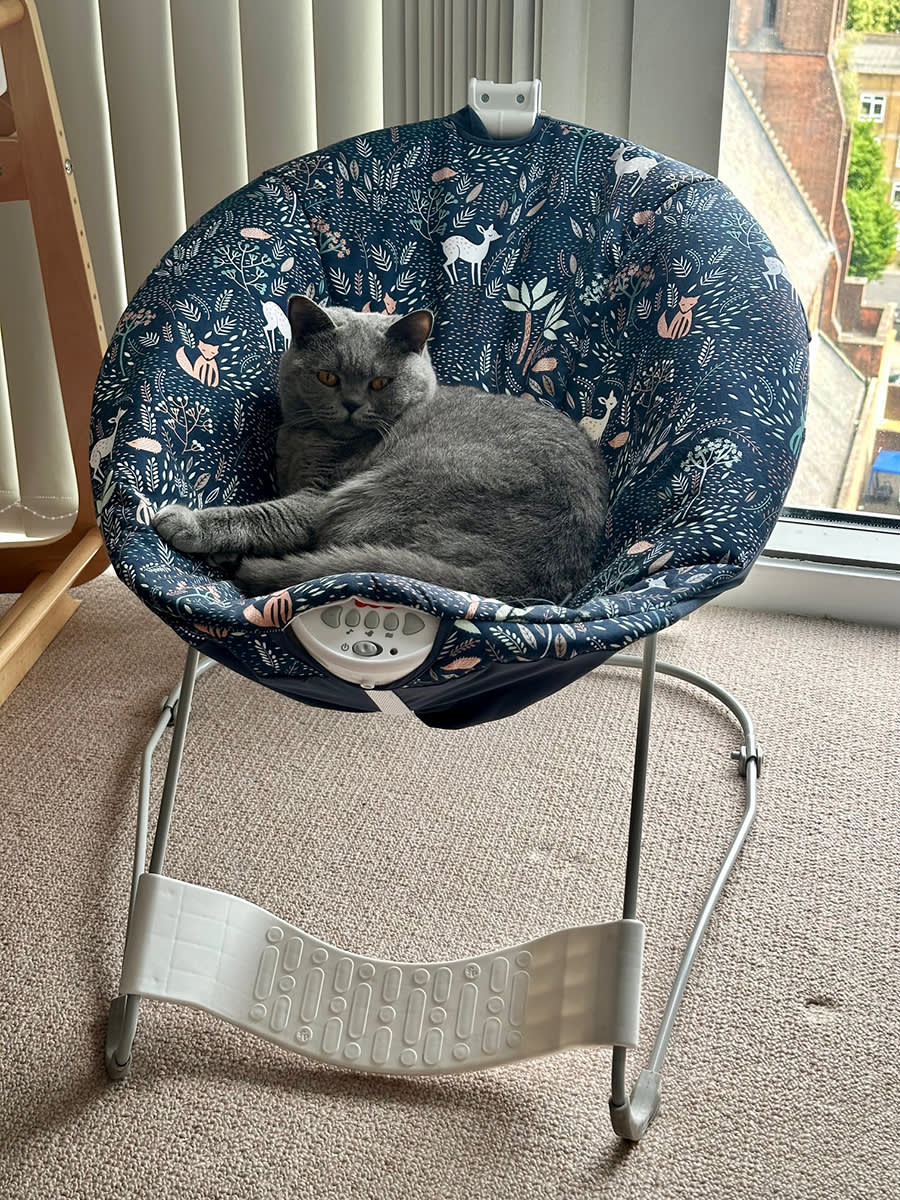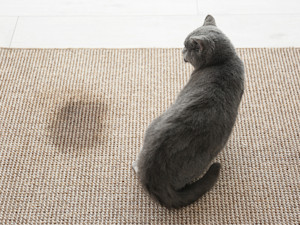How to Prepare Your Cat For a Human Sibling
A baby on the way could make for one sour puss

Share Article
For five years, my two cats have reigned supreme in our DINKWAC (dual income, no kids, with cats) millennial household, enjoying my husband’s and my undivided attention and a peaceful home. Now, with my first human baby arriving this summer, I’m anxious about disrupting their world.
We’ve already started preparing them by letting them sniff around the baby’s new things, including the crib and bouncer – which our firstborn cat has claimed as her own, sleeping in it every night.
There’s a chance they already know I'm pregnant, as they’ve been needier than usual and no longer ask to sit on my belly, requesting chin rubs instead. But what advice do experts have for preparing pampered felines like mine for a crying, unpredictable newcomer without triggering behavioural issues or jealousy?
Debunking common myths about cats and babies
You don’t need to give up your cat when baby arrives. Elin Williams, regional community behaviourist at Cats Protectionopens in new tab says: “Growing up with a pet can be an extremely rewarding experience for any youngster. Many children regard their cat as their best friend and it’s through this friendship that important lessons are learned – in trust and empathy, care and love.“
96 percent of people say there are benefits to children growing up with cats, according to a Cats Protection surveyopens in new tab.
Dr Kathryn Dench, MA VetMB MRCVS, veterinarian and owner of The Pets Kingdomopens in new tab, says a common fear is that cats will smother babies or act aggressively toward them. “In reality, cats are more likely to avoid the baby altogether. Another myth is that it’s unhygienic to have a cat around a newborn. With sensible hygiene, risks are minimal.“
What to expect: common cat reactions
“Cats are creatures of habit and sudden changes can trigger fear and anxiety,” explains Juliette Jones dipCABT, Cat Behaviour and Training Specialist at Woodgreen Pets Charityopens in new tab. “It’s common for cats to withdraw, hide away or try to get up high – especially in the first few weeks after the new baby arrives. Sometimes cats can become clingier and seek more attention.”
The most common stress-related behaviours Dr Dench sees are hiding, inappropriate urination or over-grooming. “I’d estimate that around one in five cats will show some sign of behavioural stress during big household changes.”
Preparing cats before baby arrives
It’s crucial to introduce babies to cats slowly and carefully. “Cats love routine and one of the best ways to make introducing your cat to your baby go smoothly is by introducing baby apparatus ahead of time when the cat is calm,” Williams explains.
Habituate cats to the sound of babies crying using Cats Protection's sounds libraryopens in new tab or YouTube videos, and offer treats while the sound is playing to build a positive association. To aid relaxation, run a Feliway pheromone diffuser for a minimum of 24 hours before bringing your baby home.
If you’re going to start shutting your cat out of your bedroom or another room that they usually have access to, start this ahead of time so you’re able to deal with any frustration in advance, Williams adds.
Jones recommends starting the preparation process 2–3 months before your due date. “Decorate in stages, then add one item of baby furniture at a time. Allow your cat to explore each change. Take a soft cloth and collect their scent from their cheeks, then lightly wipe it over new objects. These scent traces can make items feel more reassuring.”
Gradual routine changes are essential, adds Jones. “At least 4–6 weeks before the due date, gradually adjust routines as if the baby is already at home. If your cat is used to sitting on your lap for long periods, or you being regularly available, gently change to a routine that will fit around the schedule of having a new baby.”
Why early preparation matters
Cats interpret the world primarily through scent, followed by sound and sight. The arrival of a newborn introduces a flood of unfamiliar sensory input, which can be overwhelming, explains Jones. “To a cat, newborn crying can be very high-pitched, unpredictable and distressing. Cats are hardwired to react quickly to sudden, high-frequency noises.“
Scent disruption is equally problematic. “A newborn brings unfamiliar smells: new skin chemistry, milk, baby wipes, lotions, nappies. These can register as major disruption to the cat’s established scent map of the home.”
It’s therefore vital to introduce sounds and smells gradually over weeks and months to ease this sensory overload. Build positive associations between these sounds and smells and things the cat enjoys, such as treats, play and grooming sessions.
Health preparations
“Make sure your cat is in good health by taking them for a check-up, updating vaccinations if necessary and, if not neutered, get this done without delay,” Williams advises.
Dr Dench adds: “I recommend a full health check before baby arrives. Make sure vaccinations, flea/tick prevention, and worming are up-to-date. This avoids surprises later, when you’re sleep-deprived and juggling the early weeks with a newborn. Avoid letting the cat sleep in the baby’s crib, both for hygiene and safety reasons.”
Creating harmony when baby arrives
“When you first introduce your cat to your baby, try to stay calm and relaxed,” recommends Williams. “Take a quiet moment when you arrive home to greet your cat alone and introduce them in a neutral space. Some cats might be curious, so allow them to sniff or investigate the baby if they want to.”
Always be there to supervise and don’t force interactions. “One of the most common mistakes is rushing the introduction,” says Jones. “Always allow your cat to set the pace and never force physical contact. Keep the atmosphere quiet and neutral and don’t draw attention to the baby as an object of focus.”
Providing safe spaces is crucial. Williams explains: “A new baby can be overwhelming for a cat, so provide plenty of hiding spaces and a quiet spot for your cat to retreat to. While some cats can be fearful of babies, more often problems arise when the newborn starts to toddle around.”
Jones advises maintaining routines – feeding times, play times and grooming sessions – and providing daily mental and physical stimulation to reduce anxiety. “Find time for regular interactive play and finish with a catnip or valerian stuffed pillow for your cat to hold and kick. Enriching their feeding times with puzzle feeders will also help reduce stress and keep them focused on more positive things.”
Health and hygiene once baby’s home
Treat your cat regularly for fleas and worms, Williams advises. “Keep your cat’s litter tray well out of reach of children and clean any surfaces your cat could stand on to prevent cross-contamination. Keep your baby’s feeding utensils stored safely away from curious paws.“
As I prepare for this major life change, the experts’ advice gives me confidence that my cats will adapt – eventually. Dr Dench offers a hopeful final thought: “With patience, gradual change and a few small adjustments, cats and babies can live together peacefully. Many families tell me their cats eventually form strong bonds with their children – sometimes even becoming their favourite nap buddy or storytime companion.”
The key is respecting both my cats’ needs and my baby’s safety, allowing natural curiosity to develop at its own pace. It won’t happen overnight, but with thoughtful planning and patience, I’m optimistic that my cats will eventually welcome their younger sibling with open paws.

Natalie Gil
Natalie Gil is a freelance journalist who has written for iNews, the Irish Independent, Stylist and more. She previously worked at Refinery29, Monzo and the Guardian, and is the proud cat mum of British Shorthairs Prune and Oat.
Related articles
![baby and golden retriever on a bed]()
Science Says: Dogs May Ward Off Baby Eczema
Study suggests dogs could reduce eczema for some kids
![Man cuddling his gray cat.]()
Does Your Cat Think You’re Their Mum?
You love them like a child, but is the feeling mutual?
![Picture of a grey cat sitting next to a wet patch on a beige carpet]()
10 Reasons Why Your Cat Isn’t Using the Litter Tray
Not on the couch... again
![]()
The Rise of DINKWADs: The Dual Income Couples Who’ll Do Anything For Their Dogs
Life is sweet for the pups of these pet parents...
![]()
Dating With Pets: Does Your Pet Help (or Hinder) Your Love Life?
Is it time for your own Lady and the Tramp moment?
![Couple with a dog]()
5 Exes Who Co-Parent Their Pets & How They Make It Work
Breaking up is hard – especially with pets. Here’s how exes make co-parenting their four-legged friends work







